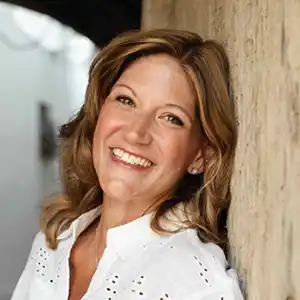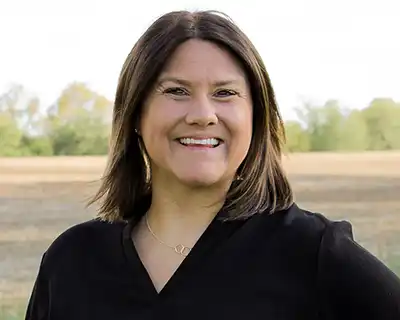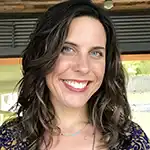Editor’s note: America’s Conservation Ag Movement has embraced farmer-to-farmer knowledge transfer as a key pillar in the strategy to accelerate regenerative ag practice adoption. At the center of the farmer learning communities, exceptional farmers have stepped forward to lead these efforts in their communities. These individuals are leaders in their own innovation and implementation of practices and programs that fit for their unique farm operation and help achieve the goal of continuous improvement. This profile is part of a series of that will highlight these Conservation Stewards, their farms, and their conservation practices throughout the year.
Kimberly Raikes is a first-generation farmer on the north side of Baltimore, where she manages Whitelock Community Farm, which grew out of the city’s Adopt-A-Lot program. The 1-acre footprint might be small, but its impact on the community is immense with its ability to provide fresh, healthy produce to residents and share knowledge and passion about farming, nutrition, and community health and wellness in an urban setting that is typically removed from agriculture. Whitelock grows produce, herbs, native fruits and nuts, and it is currently retrofitting a greenhouse to include mushrooms.
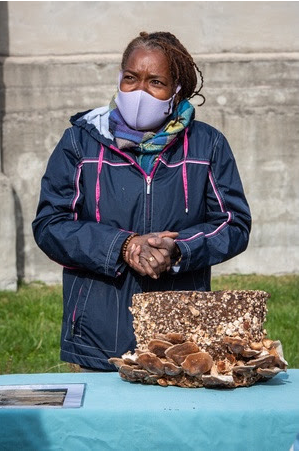
Trust In Food: How long have you been conducting conservation stewardship practices and programs? What impact have they had on your operations?
Raikes: I’ve been working for three years on practices and programs at Whitelock Community Farm in the Reservoir Hill neighborhood of Baltimore, using inherent knowledge and practices from grandfather, “Jack” Marable, and from growing up and spending summers in Fort Mitchell, Va. The biggest environmental impact has been the appearance of the farm, which has evolved into an educational asset for the community to learn the basics of farming, nutrition, and community health and wellness during weekly activities, monthly events and periodic networking functions. The Farm is more than a venue, it’s an example of progress for a city that continues to improve its citywide communications, relationship building of various stakeholders and gentrification of Baltimore’s inner city.
Trust In Food: What does the term “climate-smart agriculture” mean to you?
Raikes: “Climate-smart agriculture” for me refers to the significant shifts that are projected regarding supply and demand. It focuses on purposeful efforts to manage the use of water, waste and energy while sustaining land. Usage of rotating crops with the Simple System: root, fruit, bean, greens, as well as constant land upgrades to the farm and surrounding areas with native fruits, nuts and berry bushes as natural borders and boundaries.
Trust In Food: What would you consider your greatest achievements or strengths? What else do you want to accomplish in the next year?
Raikes: It is my prayer that I have not reached my greatest achievements. A strength has been developing an educational asset to the community for learning the basics of farming, hosting community health and wellness activities, and resource events that serve to unite the community, the farm staff, local politicians, representatives and city departments to improve communication and community.
In the next year, it is my intention to complete a current project of retrofitting a Freight Farms greenhouse to grow mushrooms. The harvest and sales will sustain the non-profit organization Acres4Change, expanding the curriculum and training of middle- and high-school agriculture students enrolled at the Green Street Academy, in Baltimore.
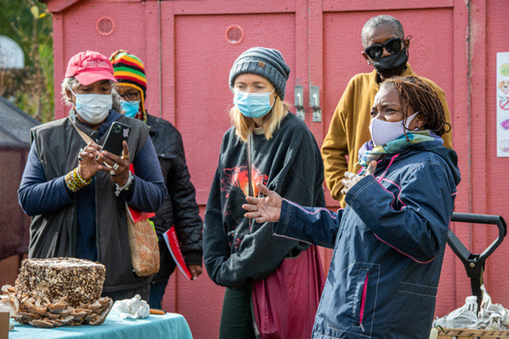
Trust In Food: Have they had any agronomic impact? Financial impact?
Raikes: Agronomic impact is limited when referring to the Adopt-A-Lot program in urban Baltimore City. But the impact on a small community that has limited access to supermarkets or neighboring corner stores with healthy, natural food choices has been huge. During COVID, providing fresh, locally grown produce in the neighborhood at a discounted price demonstrated the ability for collaboration with other community service programs and organizations.
Trust In Food: What other opportunities do you see on your farm or the farms around you?
Raikes: Additional hoop houses to maintain annual growth on a larger scale.
Trust In Food: What state or local organizations have helped you in identifying opportunities or helped you implement practices and programs? What other organizations are you affiliated with?
Raikes: University of Maryland, University of Maryland Eastern Shore, Future Harvest CASA, Farm Alliance of Baltimore, Baltimore City Department of Public Works, Black Church Food Security Network, Penn State University and Cornell University all supported the project. I am currently affiliated with the majority of the organizations listed above, as well as Chesapeake Harvest, Pennsylvania Farmers Union, Easton Economic Development, St. Francis Neighborhood Center and Acres4Change.
Trust In Food: What advice would you give other farmers as they continue to consider climate-positive practices? Have you had any failures or lessons learned in your journey that you learned from? What would you do differently with what you know today?
Raikes: The best advice to pass to other farmers regarding climate-positive practices is to educate oneself and join platforms that allow for an even exchange of knowledge, information and hands-on opportunities.
Valuable lesson learned: There is no such thing as a failure in agriculture. Each bramble, crop, plant, seed, tree and volunteer has a means of communicating. It is my responsibility as a steward to translate the information and messages to improve the quality and quantity of life.

